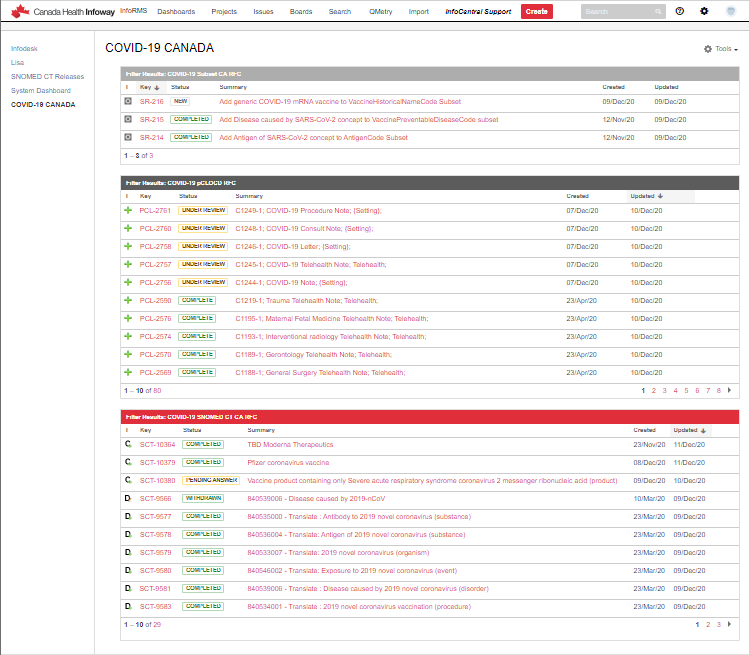As part of the global efforts to create and provide the most up to date terminology in support of the Coronavirus outbreak, the Health Terminology Community is continually working with SNOMED International and the LOINC® team at Regenstrief Institute.
The information and resources below can help keep you up to date and learn about the latest COVID-19 content updates for LOINC, pCLOCD, SNOMED CT International and Canadian Editions and other International standards used in Canada.
 COVID-19 Canada Public Health Terminology Dashboard
COVID-19 Canada Public Health Terminology Dashboard
The COVID-19 Canada Public Health Terminology dashboard contains all requests for new concepts or terms for Subsets, LOINC/pCLOCD and SNOMED CT Canadian Edition that relate to COVID-19. This dashboard provides single source access to all of the Health Terminology content developed by Infoway for COVID-19 and is viewable by authenticated users with InfoRMS access. Not sure if you have access to InfoRMS? Manage your InfoRMS Access in your user profile.
Dashboard content is updated as new subsets, terms and concepts are created. Check back frequently for the latest content.
LOINC and pCLOCD
Creating LOINC terms and other resources related to SARS-CoV-2/COVID-19 testing, documentation and reporting continues to be a primary focus for LOINC releases. All of the LOINC terms related to SARS-CoV-2/ COVID-19 content can be found on the single source LOINC page which includes both release and pre-release terms. This page is updated frequently with new terms and term edits, thus checking back regularly for the latest content is recommended.
In addition, guidance for choosing LOINCs for SARS-CoV-2 testing is available.
All of the SARS-CoV-2 LOINC laboratory test codes requested or identified by Canadian implementers were published in the latest pCLOCD release or in scope for the next pCLOCD release. All of these terms are listed in the COVID-19 Canada Dashboard.
If you need new codes, please submit a Request for Change (RFC).
Resources
- Full list of LOINC terms related to SARS-CoV-2/COVID-19
- Guidance for mapping to SARS-CoV-2 LOINC terms
SNOMED International and Canadian Edition
The Canadian Edition of SNOMED CT contains COVID-19 concepts from the SNOMED CT International Edition including descriptions, language refset files, adjustments to the ICD-10 map, and related RF2 terminology artefacts. The Canadian Edition of SNOMED CT also includes French translation of all COVID-19 concepts. All of these terms are listed in the COVID-19 Canada Dashboard.
If you need new concepts, please submit a Request for Change.
Resources
ICD-10-CA
Canadian Institute for Health Information (CIHI) is committed to collecting, analyzing, and sharing credible health data to help improve our health care systems and the health of all Canadians. They have compiled key reports and resources containing information related to the coronavirus disease (COVID-19) pandemic which will be updated with new content whenever possible.

